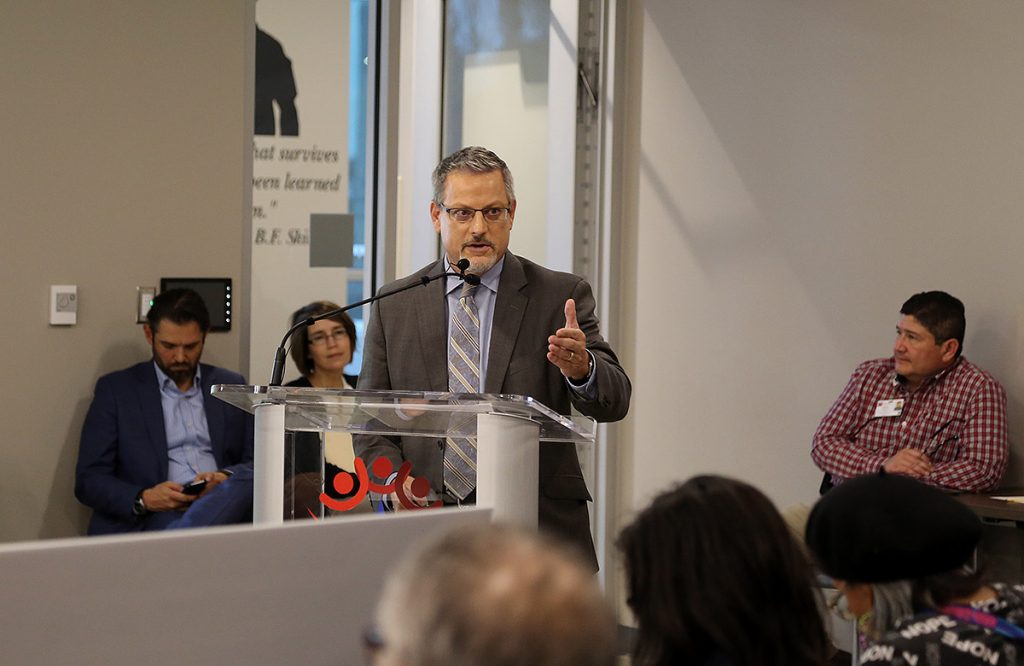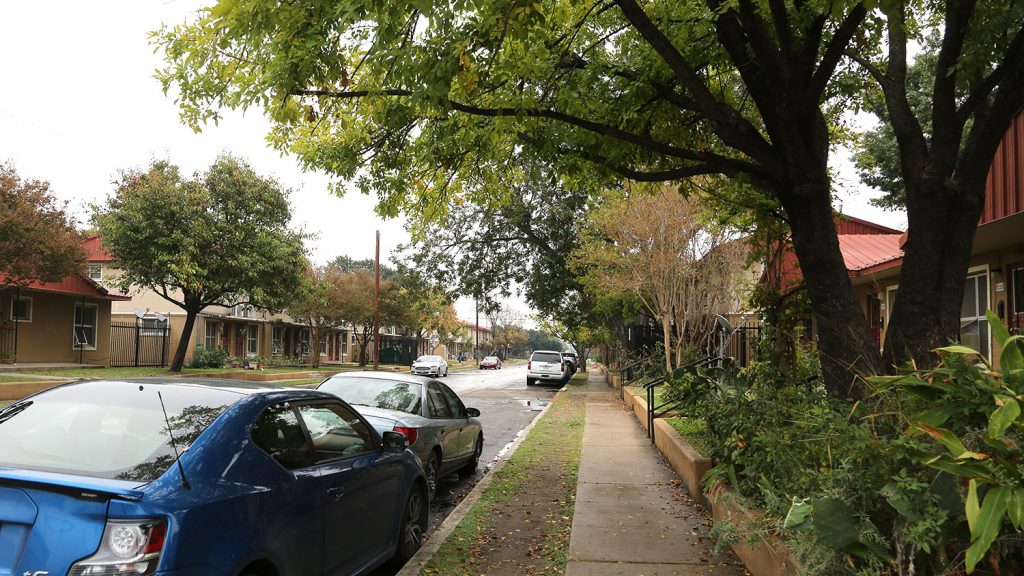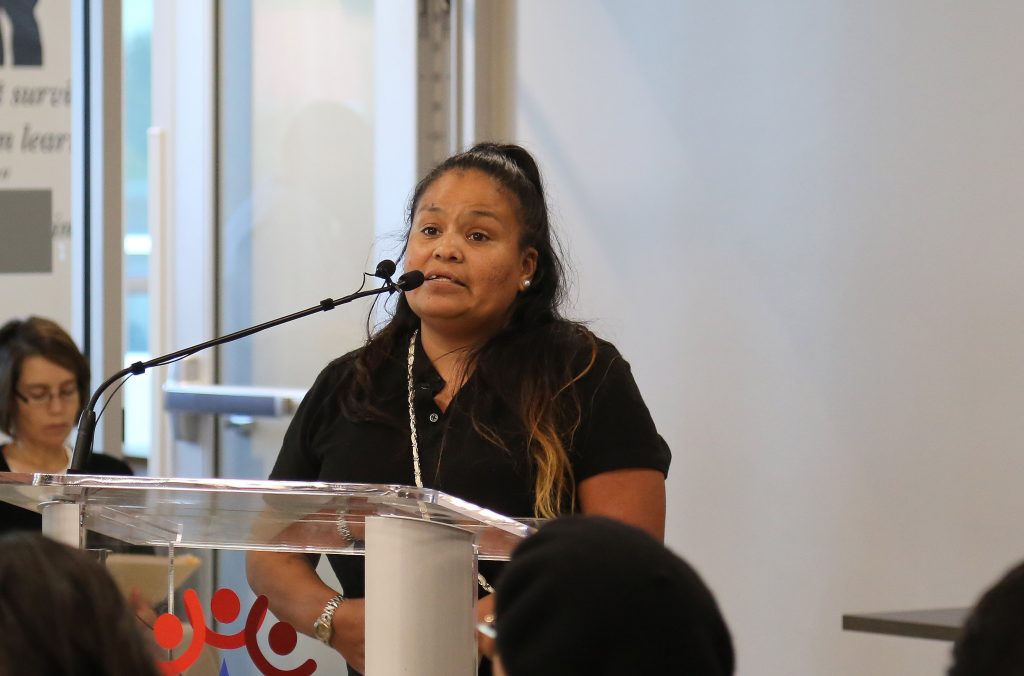
Responding to mounting criticism over the San Antonio Housing Authority’s eviction policy, CEO and President David Nisivoccia on Wednesday said the agency will place a moratorium on non-criminal evictions at all SAHA properties through Dec. 31—a practice SAHA has followed during the holidays in recent years—while his staff considers changes to its system. Nisivoccia stopped short of making any promises to the Housing Commission, which asked him to address the concerns on Wednesday, and to the few dozen public housing residents and community organizers who attended the meeting.
He did, however, concede that changes need to be made and that the system is flawed in places. For example, on the unregistered pet fee, which accrues by $10 each day it’s not resolved, “I think we’re piling on there a little bit,” he said.
The condemnations in recent months have come from residents living at the Alazan-Apache Courts, who say its management is recklessly doling out lease violations, which, for lower-income families, can inevitably result in the start of the eviction process. Or, the management is mis-handling some cases by not following procedure—such as issuing 3-day eviction notices for less egregious noncriminal offenses, when those households are supposed to be given up to 14 or 30 days to leave—and by misplacing documents that would help residents clear up disputes.
“We’ll also look at how we communicate with our (residents) better, before (issuing) a notice to vacate,” Nisivoccia said while speaking to the commission, of which he is a member, and the residents. He said, for the time being, he and his staff will review eviction cases at Alazan-Apache rather than the management.
[ Editor’s note: For a more in-depth examination of the residents’ complaints, read ” ‘It’s like prison.’ Some Alazan-Apache residents accuse SAHA of pushing them toward eviction.” ]

This is the first in an occasional series on evictions in San Antonio, an incredibly complex topic we’ll be exploring in the coming months. If you have been evicted, or are going through the process, we’d like to know. Contact me at ben@saheron.com
The meeting came two days after Nisivoccia made the same pledge to re-evaluate SAHA’s eviction policies to the residents and their supporters, including the Esperanza Peace & Justice Center, at a closed-door meeting on Monday.
Some of the residents who attended both meetings said they were skeptical as to what may result from Nisivoccia’s pledge.
“Again, he’s falling on policy—the policy’s this and the policy’s that—and he’s expecting it to happen that way,” said Kayla Miranda, a mother of four, who lives at Alazan-Apache Courts, and who was taken to eviction court last month by SAHA. She said she was unjustly hit with a pet fee, among other maintenance fees, which accumulated into a debt she couldn’t pay. “Why isn’t he down at the Alazan office … finding out what’s happening with these employees?”
She continued, “I think it’s a good start. And if he follows what he says he’s going to do, and actually investigates it, then I think it can be a good thing. But again, we don’t want empty promise or words. We want action. We want to see something actually happen.”
At the Alazan-Apache property, which also includes the nearby Guadalupe subdivision of single-family homes, more than 1,800 residents live in 741 public housing units.
In the last fiscal year, which ended Sept. 30, there were 44 evictions at Alazan-Apache, and 12 instances where households were given notices to vacate and then left on their own—or, “involuntary terminations.” In the 2018 fiscal year, there were 55 evictions and 22 involuntary terminations. In fiscal year 2017, there were 21 evictions and 21 involuntary terminations. In fiscal year 2016, there were 38 evictions and 20 involuntary terminations.
[ Editor’s note: The Heron has asked SAHA for eviction totals by calendar year for Alazan-Apache going back to 2011. ]
At Wednesday’s meeting, Nisivoccia said SAHA’s eviction rate for fiscal year 2019 was 3.14 percent, which is calculated by dividing the total number of evictions by the average number of units occupied. In total, there are 13,137 people living in public housing in San Antonio, and 6,092 actual units, according to SAHA.

‘Bad actors’
During the two-hour discussion on Wednesday, after Nisivoccia responded to criticism from residents and supporters, he then felt heat from the commissioners who, for the first time, had a chance to ask questions. The residents first attended the previous Housing Commission meeting, held Oct. 23, but the commissioners couldn’t interact with them because the issue wasn’t on the agenda. Also, Nisivoccia didn’t attend that meeting because he was in Washington, D.C., requesting more funding from the U.S. Department of Housing and Urban Development.
The commissioners suggested to Nisivoccia that SAHA might extend the moratorium, as well as freeze the accumulation of fees, until the agency reaches some sort of conclusion. To those suggestions, Nisivoccia said he’d “take it under advisement.”
They also echoed the residents’ complaints about so called “bad actors”—SAHA employees who might be acting too aggressively or incompetently toward residents.
“I’m not hesitant to remove an employee,” said Nisivoccia, ensuring better training for SAHA’s front-line employees. “We have removed people in the past.” He added that he wanted to better educate residents so they’re more aware of SAHA’s appeal process when it comes to lease violations and evictions.
He added, “I’m sure the staff is correct in some instances,” in regards to lease violations and notices to vacate.

Last month, Veronica Compean, 42, says she was evicted because of one of these management mishaps. She had lived at Alazan-Apache for nearly four years. In October she was forced to leave and soon found herself at Haven for Hope, regrouping her life.
“I am homeless, and it’s been a lot of stress on me, I suffer from anxiety and mental PTSD,” Compean told the commission.
In August, the day before her court date at Justice of the Peace, Precinct 2, Compean went into the Alazan-Apache office to pay her balance. That’s when the person she was dealing with at the office told her she didn’t have to go to court the next day, she told the commission. The next day, SAHA was granted a default judgment, meaning the court ruled in the agency’s favor because Compean was a no-show. Two months later, Compean found herself at Haven for Hope, eventually evicted for owing $58 in late fees, she says.
Currently, Compean is staying at a Motel 6 downtown with the assistance of the city’s anti-displacement fund.
Nisivoccia said his staff has already begun looking at how other housing agencies collect rent and late fees. SAHA merges the two into one debt, so, for a resident who might have debt related to fees, when they attempt to pay rent, those funds are applied to the fees first—and the rent is never fully paid. The alternative is that an agency separates the rent and fees, so they’re each resolved on their own. Nisivoccia suspects housing authorities use both methods equally.
“We’ll fall on the side that’s more human than administrative,” Nisivoccia said.
Rep Diego Bernal said he’s looking at introducing a bill at the next Texas Legislative session that would require housing agencies to separate fees owed and rent owed.
Nisivoccia said SAHA would also review how it handles residents’ documents, such as paystubs or doctors notes, to keep them from getting lost; and consider giving residents whose utilities have been shut off 14 days to vacate instead of three.
Contact Ben Olivo at 210-421-3932 | ben@saheron.com | @rbolivo on Twitter
Nisivoccia has been hearing concerns from us for months. His claim that he’s unaware of problems is false.
Whether the unjustified evictions at Alazan-Apache or the mold at Blanco, the racial discrimination at Chatham and Marie McGuire, Nisivoccia is aware and has called us “rogues and liars.”
His contemp for low-income tenants who are primarily Black or Brown is clear to us.
-Pancho Valdez, Organizer
San Antonio Tenants Union
You’re not illegal alien enough to get any real sympathy, not drug user enough to get sympathy, tissues, and pill bottles, and you’re issue isn’t political enough to get votes if you back it. Sorry, man.